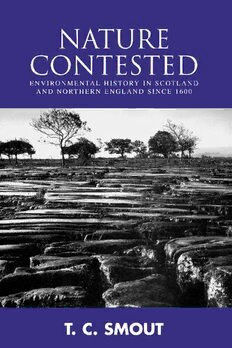
Nature Contested: Environmental History in Scotland and Northern England PDF
Preview Nature Contested: Environmental History in Scotland and Northern England
NATURE CONTESTED NATURE CONTESTED Environmental History in Scotland and Northern England since 1600 T.C.SMOUT EDINBURGH University Press What would the world be, once bereft Of wet and of wildness? Let them be left, O let them be left, wildness and wet; Long live the weeds and the wilderness yet. Gerard Manley Hopkins (1844-89), Inversnaid © T. C. Smout, 2000 Transferred to Digital Print 2009 Edinburgh University Press Ltd 22 George Square, Edinburgh Typeset in Bulmer by Pioneer Associates, Perthshire, and Printed and bound in Great Britain by CPI Antony Rowe, Chippenham and Eastbourne A CIP Record for this book is available from the British Library ISBN 0 7486 1410 9 (hardback) ISBN 0 7486 1411 7 (paperback) The right of T. C. Smout to be identified as author of this work has been asserted in accordance with the Copyright, Designs and Patents Act 1988. CONTENTS Acknowledgements ix List of Illustrations xi List of Figures xiii Introduction 1 1 Use and Delight: Attitudes to Nature since 1600 7 2 Woods of Imagination and Reality 37 3 Making and Using the Soil 64 4 Commanding the Waters 90 5 The Fragile Hill 116 6 The Quarrel over the Countryside 142 Notes 173 Select Bibliography 191 Index 201 Thi t t d l d d f Thi t t d l d d f ACKNOWLEDGEMENTS My first thanks must be to the Ford's electors of the University of Oxford who invited me to give the lectures on which this book is based, and to St Catharine's College who elected me to a visiting Christensen Fellowship for the duration of my stay in the city. The University of York honoured me with a Visiting Professorship in 1998-9 which enabled me to improve my knowledge of the environmental history of the north of England, assisted by their friendly historians and economic historians. My own University of St Andrews was patient in my endless search for library materials. To my wife Anne-Marie I owe boundless support, and to Margaret Richards equally boundless patience in fielding one draft after another. David Jenkins was a kind and severe critic of the first draft: I hope he finds it improved, but I cannot promise to please him. Different parts were read and commented upon by Donald Davidson, Jeff Maxwell, John Sheail, Robert Lambert and Roger Crofts. I owe many debts of conversation and information to other friends and colleagues in Scottish Natural Heritage - Magnus Magnusson, Michael Usher, Des Thompson, John Mackay, John Thomson, Alan Macdonald, Chris Badenoch and Dick Balharry. To Chris Lowell I owe endless stimulation as we drove round Scotland preparing broadcasts for the Radio Scotland 'Battle for the Land' series. I am afraid he may recognise some of his ideas and observations unattributed. One person we contacted at that time was Catherine Benton of West of Scotland Water, and I owe a debt to her and to the company for the opportunity to use papers in their offices at Milngavie. The archivist at the National Trust for Scotland was similarly helpful: I would like to spend more time in that fine archive. John and Philippa Grant allowed me into their attics at Rothiemurchus and plied me with much kind hospitality whenever I emerged. The Duke of Buccleuch generously allowed access to the Drumlanrig game books. Roland Paxton and Michael Chrimes gave me advice on where to look for water engineers. Richard Smout found a ref- erence to sparrows I could not resist using, even if it does relate to the Isle of Wight. Dr Bill Bourne shared his expertise on medieval herons. Derek Langslow of English Nature and Jeremy Greenwood of the British Trust for Ornithology provided me with material for two of the figures in Chapter 3. There are many other friends and scholars to whom I owe ix
